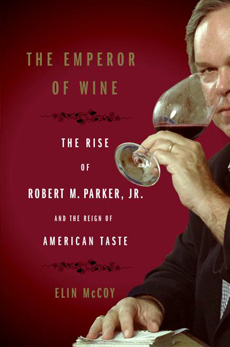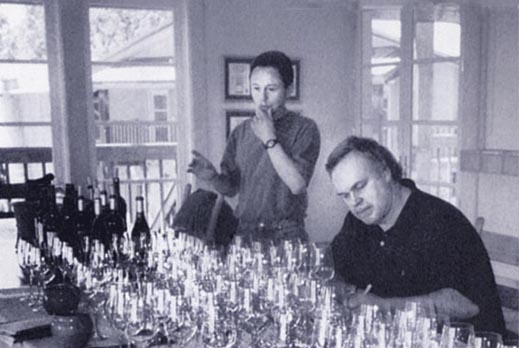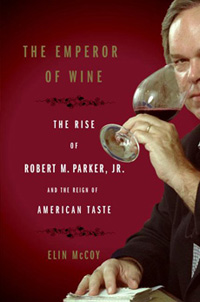

Learn about the most influential critic on the planet—and in the process, the history of the modern wine industry.
|
KAREN HOCHMAN is Editorial Director of THE NIBBLE™.
|
|
July 2006
|
 |
The Emperor Of Wine: The Rise Of Robert M. Parker, Jr. And The Reign Of American Taste
By Elin McCoy
On the surface, The Emperor of Wine is the biography of Robert M. Parker, Jr., the world’s most influential and controversial wine critic—or, as author Elin McCoy points out in her preface, the most powerful critic anywhere. Because while a restaurant or theatre critic’s reviews only impact sales in his city and a book or film critic’s reviews impact sales in his country, Robert Parker’s reviews impact the sales of wines worldwide. Consumers—and therefore retailers, importers, and vintners—use his ratings to decide what to buy. A score of 90 and above is cause for jubilation and, if the winery is public, can cause the stock prices to rise. Lower scores—or no scores at all, if Parker doesn’t review your wines—can cause financial ruin.
The ignominy is that, while some men are born great, to quote Shakespeare, Parker had it thrust upon him*. Living modestly in rural Maryland, he sought only to earn a living by publishing a local wine newsletter, the Baltimore-Washington Wine Advocate (now The Wine Advocate), and to get enough subscribers so that he could leave his job as a bank lawyer. From his first days as an avocational college wine-taster he was floridly opinionated; in his first year of publishing his newsletter (for 300 or so subscribers) he was equally so; 25 years and 45,000 subscribers later, he hasn’t changed a whit. Would anyone have expected him to?
*Malvolio, Twelfth Night, Act II, Scene 5: “Be not afraid of greatness: some men are born great, some achieve greatness and some have greatness thrust upon them.”
What did change were the circumstances around Robert Parker. He succeeded beyond his wildest dreams through hard work, a great nose and palate, anticipating what consumers wanted and being in the right place at the right time. He invented the 100-point wine rating scale that paralleled the school grading system that American consumers could relate to. His palate had an “American” sensibility that the new generation of baby boomer wine buyers could relate to. His writing style, plain language for everyman, was different from the flowery and elitist wine writers of the time. And five years after he began publishing, in 1983, he correctly predicted the greatness of the 1982 Bordeaux vintage when other critics dismissed it, putting his name on the lips of wine cognoscenti everywhere. And, he became “the” reviewer in America when America was becoming the most important wine market in the world. Thus, he became the most influential person in the world to winemakers the world over.

Parker tasting at Napa Valley’s Shafer Vineyards with winemaker Elias Fernandez in May 2002. Photo from The Emperor of Wine.
When Parker first began to taste wines, in the 1960’s, America was still a hard liquor and Coca-Cola® drinking country: cocktails were king; most people did not drink wine. Today, it is the biggest wine market in the world. Many wealthy people have seemingly infinite dollars to spend snapping up the great wines of the world, and many others with lesser amounts are ready to spend on the middle ground. At both price levels, Americans eager to learn about wine needed reviewers to tell them what was good. Parker was an “independent” beholden to no one, which insured his integrity and rang a bell with consumers. He didn’t accept press junkets, paid his way to all events, and bought all of his own wine for his tasting and evaluation.
At a tipping point described in the book, Parker’s independence, his straightforward writing and mostly his instantly-accessible scores (which he intended as an adjunct to the full review) made him “the” wine authority. Even those who didn’t know who Robert Parker was knew that a wine rated 89 was better than a wine rated 83...and came to rely on “RP” scores, which retailers hastened to include in their ads, in their store windows, and attached to their shelves. Companies sprang up that printed the “shelf-talkers” for retailers who were too busy to get them done on a timely basis. The Parker Phenomenon was on a roll. Wineries would sell out overnight based on Parker scores over 90; those with scores in the 70s couldn’t move their stocks.
Many, many people were thrilled—to the tune of millions of dollars in their pockets—that there was a Robert Parker teaching Americans (and soon, wine buyers worldwide, even the French) what to look for in wines. But, as the saying goes ...watch what you ask for—you just might get it. What some sectors of the wine world cheered for in the mid-1980’s, caused them to tear their hair out ten years later.
To say that Robert Parker stands at the center of a heated controversy is an understatement. The same person who has been awarded the French Legion of Honor by President Jacques Chirac for “being the man who taught America about French wine” is no longer welcome in Burgundy. Even in Bordeaux, winemakers accuse him of demanding that wines be made “my way or the highway” (quotes mine) in order to get high scores. His influence is so great, he has been accused of remaking the world’s wine industry into a single global market, causing prices of his top-rated wines to skyrocket beyond the reach of most wine-lovers, and single-handedly reshaping the taste of wine to his own preference as vintners change the way they make their wines to earn high scores from him. This feeds the cycle of getting higher prices for their wines. In the process, many claim, his preference for big, bold wines over terroir is killing centuries of winemaking tradition and the very essence of the uniqueness of wine.
Nobody questions Parker’s integrity, commitment to the industry, or his absolute belief in what he writes. He has made others extremely wealthy by recommending their wines, but over the years has not accepted a single case of wine as a gift (he purchases all of his wines including those he tastes each week at his home, except those that arrive unsolicited—which he may or may not taste—and those which are poured at industry tastings for which no fees are charged). He does not buy wine futures and rails against speculation in wine which has made others wealthy. His income comes largely from his newsletter and book publishing, and he is very active in charitable activities.
The Emperor of Wine traces the life of Robert Parker from the beginning, and at the same time is equally a review of the wine industry and its other players from the Repeal (the end of Prohibition) on. Did you know, e.g., that Frank Schoonmaker and Alexis Lichine invented the word varietal? Elin McCoy is a very colorful or descriptive reader, making us want to seek out more of her writing: the book is a real page-turner.
Even those who know nothing about wine may find in this story a story for the ages that can be taught in philosophy, political science and business school classes around the world:
When one is extremely gifted, works exceptionally hard, reaches the top of his profession, and then finds that what comes with that position is enormous influence .... what does one do with that power? Walk away from it? Change his principles to moderate it? Bend to the public view of it?
Robert Parker never set out to be emperor, to control the a world market, to make or break the fortunes of winemakers. He only set out to create “a pro-consumer wine buying guide,” giving his opinions of as many wines as he could taste. That he still does. Remember when you read this very readable book that Robert Parker did not create the situation: consumer and industry demand created Robert Parker. At any time, the can create throw their support behind a pretender. Robert Parker himself would agree that it’s a lot more enjoyable to be a kingmaker than to wear the heavy mantle and crown of king.

|




